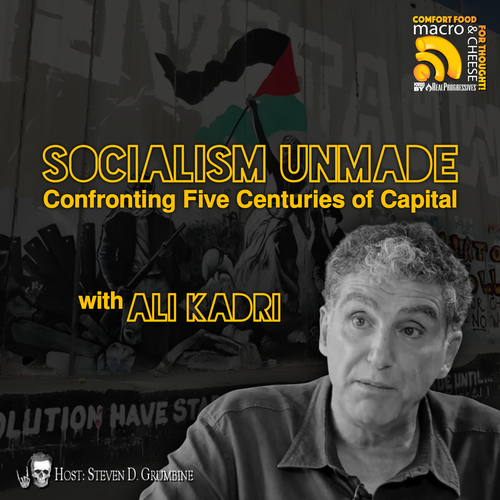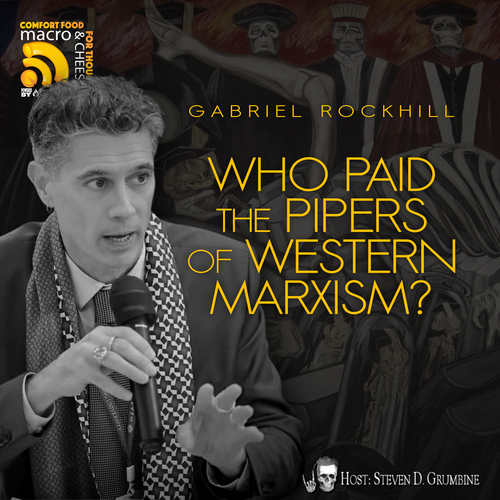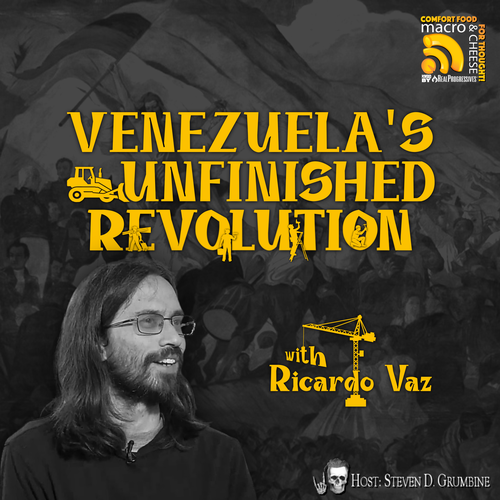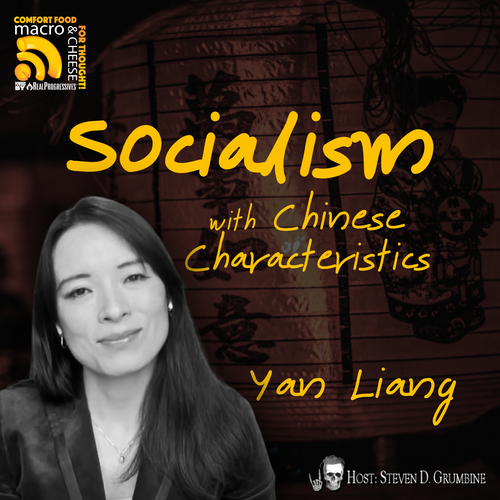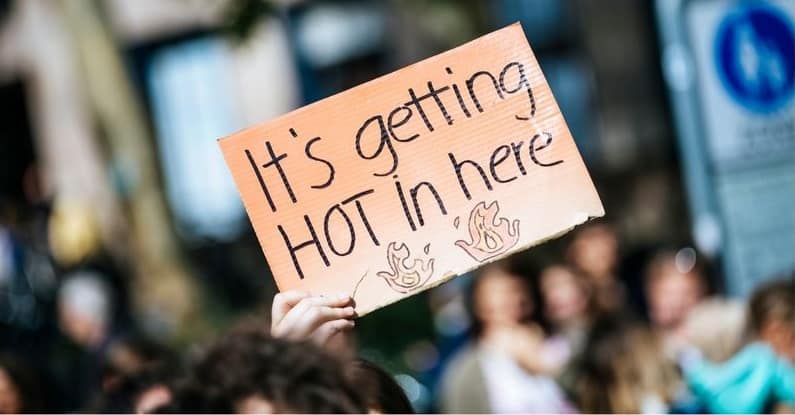Episode 243 – RP Live Presents Africa’s Quest for Economic Liberation with Ndongo Samba Sylla
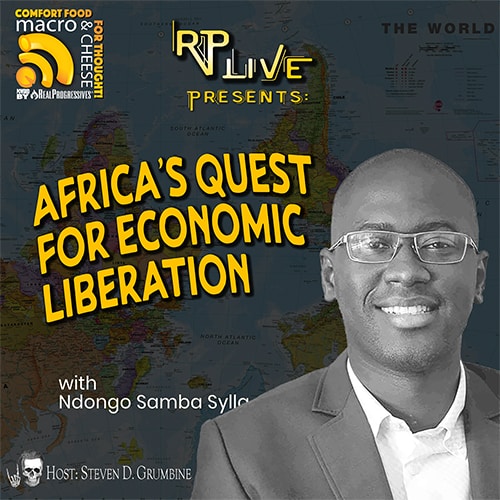
FOLLOW THE SHOW
Thomas Sankara’s agenda for African development and self-sufficiency is only enhanced by MMT. Ndongo Samba Sylla shares insights on economic liberation.
“The impossibility of economic catch-up does not imply that the citizens of the global South are condemned to suffer from poverty and inequality. It only implies that capitalism has nothing to offer as a prospect of a decent life for the vast majority of humanity…”
In this webinar from our popular RP Live series, Ndongo Samba Sylla tells us of the challenges facing Africa through the story of Thomas Sankara and breaks down what Sankara meant when he told the people to “live as African.” Ndongo suggests that the way forward combines the insights provided by MMT with Sankara’s plans for African liberation and development. He calls it MMT-ing Sankara or Sankara-ing MMT. Since some see MMT as apolitical, Ndongo is making a crucial point. He also goes into detail as to why cancelling international debt, though necessary, is not enough.
After his presentation, Ndongo takes questions from attendees on the role of BRICS and potential benefits for Africa in a multipolar world. He touches on the CFA franc and explains why economic exploitation is the most vicious form of imperialism.
Ndongo Samba Sylla is a Senegalese development economist. He has previously worked as a technical advisor at the Presidency of the Republic of Senegal and was Programme Manager at the West Africa office of the Rosa Luxemburg Foundation. He has recently been appointed the Africa Director for Research and Policy at IDEAs (International Development Economics Associates)
He is the co-author of Africa’s Last Colonial Currency: The CFA Franc Story and author of The Fair Trade Scandal. Both books can be ordered through the RP Bookshop on our website: realprogressives.org
Due to the length of the episode, we will not be publishing the transcript on the website.
“The greatest difficulty we have faced is the neocolonial attitude that induces us to believe that a foreigner is more qualified to speak about Africa than an African.”
Thomas Sankara
GUEST BIO
Ndongo Samba Sylla is a Senegalese development economist. He has previously worked as a technical advisor at the Presidency of the Republic of Senegal and is Programme manager at the West Africa office of the Rosa Luxemburg Foundation. His interests include Fair Trade, labor markets, democratic theory and monetary sovereignty. He holds a PhD. from the University of Versailles (UVSQ).
Dr. Sylla’s books can be found here:
https://bookshop.org/search?keywords=Ndongo+samba+sylla
Ndongo’s Twitter is @nssylla
PEOPLE MENTIONED
Fadhel Kaboub
is an Associate Professor of economics at Denison University, the President of the Global Institute for Sustainable Prosperity, and the Under Secretary General for Financing for Development with The Organization of Educational Cooperation in Addis Ababa, Ethiopia.
https://denison.edu/news-events/featured/148775
https://denison.edu/news-events/featured/148775
Rosa Luxemburg
was an early 20th century Polish-born German revolutionary and agitator who played a key role in the founding of the Polish Social Democratic Party and the Spartacus League, which grew into the Communist Party of Germany. As a political theoretician, Luxemburg developed a humanitarian theory of Marxism, stressing democracy and revolutionary mass action to achieve international socialism.
https://www.britannica.com/biography/Rosa-Luxemburg
Thomas Sankara
was a military officer and proponent of Pan-Africanism who was installed as president of Upper Volta (later Burkina Faso) in 1983 after a military coup. Sankara declared the objectives of the “democratic and popular revolution” to be primarily concerned with the tasks of eradicating corruption, fighting environmental degradation, empowering women, and increasing access to education and health care, with the larger goal of liquidating imperial domination. He held the presidency until 1987, when he was killed during another coup.
https://www.britannica.com/biography/Thomas-Sankara
Blaise Compaoré
was a military leader and politician who ruled Burkina Faso from 1987, seizing power following a coup. He resigned on October 31, 2014, following days of violent protest. In April 2021 a military tribunal in Burkina Faso charged 14 people, including Compaoré, in relation to the circumstances of former leader Thomas Sankara’s assassination following the 1987 coup. The tribunal’s verdict, announced on April 6, 2022, found Compaoré guilty, and he was sentenced to life in prison.
https://www.britannica.com/biography/Blaise-Compaore
Patrice Lumumba
was a Congolese politician and independence leader who served as the first prime minister of the Democratic Republic of the Congo from June until September 1960, following the May 1960 election. He was the leader of the Congolese National Movement (MNC) from 1958 until his execution in January 1961. Ideologically an African nationalist and pan-Africanist, he played a significant role in the transformation of the Congo from a colony of Belgium into an independent republic.
https://en.wikipedia.org/wiki/Patrice_Lumumba
Celso Furtado
was a Brazilian economist whose work focused on development and underdevelopment and on the persistence of poverty in peripheral countries throughout the world. He is viewed, along with Raúl Prebisch, as one of the main formulators of economic structuralism, an economics school that is largely identified with The Economic Commission for Latin America (CEPAL), which achieved prominence in Latin America and other developing regions during the 1960s and 1970s and sought to stimulate economic development through governmental intervention, largely inspired on the views of John Maynard Keynes.
https://en.wikipedia.org/wiki/Celso_Furtado
https://library.brown.edu/collections/skidmore/portraits/celsoFurtado.html
Samir Amin
was an Egyptian French Marxian economist, political scientist, and world-systems analyst. He is noted for his introduction of the term Eurocentrism in 1988.
https://en.wikipedia.org/wiki/Samir_Amin
Karl Marx
Karl Heinrich Marx was born in 1818 in the Rhine province of Prussa and was a revolutionary, sociologist, historian, and economist. “Marx was before all else a revolutionist” eulogized his associate, and fellow traveler, Friedrich Engels saying he was “the best-hated and most-calumniated man of his time,” yet he also died “beloved, revered and mourned by millions of revolutionary fellow-workers.”
https://www.britannica.com/biography/Karl-Marx
https://www.investopedia.com/terms/k/karl-marx.asp
https://plato.stanford.edu/Entries/marx/
John Maynard Keynes
was an early 20th-century British economist, best known as the founder of Keynesian economics and the father of modern macroeconomics. One of the hallmarks of Keynesian economics is that governments should actively try to influence the course of economies.
https://www.investopedia.com/terms/j/john_maynard_keynes.asp
https://www.britannica.com/biography/John-Maynard-Keynes
Joseph Schumpeter
was an Austrian political economist. He served briefly as Finance Minister of Austria and in1932, he emigrated to the United States to become a professor at Harvard University.
https://en.wikipedia.org/wiki/Joseph_Schumpeter
Raúl Prebisch
was an Argentine economist known for his contributions to structuralist economics such as the Prebisch–Singer hypothesis, which formed the basis of economic dependency theory. He became the executive director of the Economic Commission for Latin America (ECLA or CEPAL) in 1950.
https://en.wikipedia.org/wiki/Raúl_Prebisch
Joseph Mobutu
was president of Zaire (now the Democratic Republic of the Congo) who seized power in a 1965 coup and ruled for some 32 years before being ousted in a rebellion in 1997.
https://www.britannica.com/biography/Mobutu-Sese-Seko
“The role of the U.S. dollar as the world’s global reserve currency has been regarded as a great advantage to the United States but actually it is a destabilizing burden rather than an “exorbitant privilege.”
Michael Pettis, Are We Starting to See Why It’s Really the Exorbitant “Burden”?, https://carnegieendowment.org/chinafinancialmarkets/56856
INSTITUTIONS / ORGANIZATIONS
Organisation of African Unity
was an intergovernmental organization established on 25 May 1963 in Addis Ababa, Ethiopia, with 32 signatory governments. It was disbanded on 9 July 2002 and replaced by the African Union (AU)
https://en.wikipedia.org/wiki/Organisation_of_African_Unity
Association of Southeast Asian Nations (ASEAN)
was established on 8 August 1967 in Bangkok, Thailand, with the signing of the ASEAN Declaration (Bangkok Declaration) by the Founding Fathers of ASEAN: Indonesia, Malaysia, Philippines, Singapore and Thailand. Brunei Darussalam joined ASEAN on 7 January 1984, followed by Viet Nam on 28 July 1995, Lao PDR and Myanmar on 23 July 1997, and Cambodia on 30 April 1999, making up what is today the ten Member States of ASEAN.
https://asean.org/about-asean/
Economic Commission for Latin America (ECLA) (Spanish CEPAL)
was established by a UN Economic and Social Council resolution in February 1948 and began to function that same year. The scope of the Commission’s work was later broadened to include the countries of the Caribbean.
Club of Rome
is a nonprofit, informal organization of intellectuals and business leaders whose goal is a critical discussion of pressing global issues. The Club of Rome was founded in 1968 and consists of one hundred full members selected from current and former heads of state and government, UN administrators, high-level politicians and government officials, diplomats, scientists, economists, and business leaders from around the globe.
https://en.m.wikipedia.org/wiki/Club_of_Rome
Intergovernmental Panel on Climate Change (IPCC)
is the United Nations body for assessing the science related to climate change.
Third World Forum
is an international network of research centers. Third World Forum was established in 1975 and is based in Dakar. It was among the organizations that helped to set up the World Forum for Alternatives, created in Cairo in 1997. Samir Amin was its co-founder.
https://en.wikipedia.org/wiki/Third_World_Forum
World Bank
is an international financial institution that provides loans and grants to the governments of low- and middle-income countries for the purpose of pursuing capital projects. The IMF concerns itself with macro goals, while the World Bank operates on a sectorial basis.
https://en.wikipedia.org/wiki/World_Bank
Arab African International Bank (AAIB)
is an investment banking group headquartered in Johannesburg, South Africa and operating subsidiaries in dozens of African and Asian markets.
The New Development Bank
formerly referred to as the BRICS Development Bank, is a multilateral development bank established by the BRICS states.
International Monetary Fund (IMF)
is a major financial agency of the United Nations, and an international financial institution claiming it’s mission to be “working to foster global monetary cooperation, secure financial stability, facilitate international trade, promote high employment and sustainable economic growth, and reduce poverty around the world.” The IMF concerns itself with macro goals, while the World Bank operates on a sectorial basis.
https://en.m.wikipedia.org/wiki/International_Monetary_Fund
European Union (EU)
The evolution of what is today the European Union (EU) from a regional economic agreement among six neighboring states in 1951 to today’s hybrid intergovernmental and supranational organization of 27 countries across the European continent stands as an unprecedented phenomenon in the annals of history.
https://www.cia.gov/the-world-factbook/countries/european-union/
https://european-union.europa.eu/index_en
Eurozone
or “euro area” is a currency union of 20 member states of the European Union that have adopted the euro as their primary currency and sole legal tender, and have thus fully implemented the Economic and Monetary Union of the European Union (EMU) policies.
https://en.wikipedia.org/wiki/Eurozone
European Central Bank (ECB)
is the prime component of the Eurosystem and the European System of Central Banks (ESCB) as well as one of seven institutions of the European Union. It is one of the world’s most important central banks.
https://en.wikipedia.org/wiki/European_Central_Bank
https://www.ecb.europa.eu/home/html/index.en.html
European Commission
is the EU’s politically independent executive arm. It is alone responsible for drawing up proposals for new European legislation, and it implements the decisions of the European Parliament and the Council of the EU.
https://commission.europa.eu/index_en
BRICS
The acronym began as a somewhat optimistic term to describe what were the world’s fastest-growing economies at the time. But now the BRICS nations — Brazil, Russia, India, China, South Africa — are setting themselves up as an alternative to existing international financial and political forums.
https://www.dw.com/en/a-new-world-order-brics-nations-offer-alternative-to-west/a-65124269
https://www.silkroadbriefing.com/news/2023/03/27/the-brics-has-overtaken-the-g7-in-global-gdp/
Group of Twenty (G20)
is a forum for international economic cooperation. It plays a role in shaping and strengthening global architecture and governance on all major international economic issues.
https://www.g20.org/en/about-g20/
World Trade Organization (WTO)
is the only global international organization dealing with the rules of trade between nations. At its heart are the WTO agreements, negotiated and signed by the bulk of the world’s trading nations and ratified in their parliaments. The goal is to ensure that trade flows as smoothly, predictably and freely as possible.
https://www.wto.org/english/thewto_e/thewto_e.htm
EVENTS
May 68 (French: Mai 68)
Beginning in May 1968, a period of civil unrest occurred throughout France, lasting seven weeks and punctuated by demonstrations, general strikes, and the occupation of universities and factories. At the height of events, the economy of France came to a halt. The protests reached a point that made political leaders fear civil war or revolution; the national government briefly ceased to function after President Charles de Gaulle secretly fled France to West Germany on the 29th.
https://en.m.wikipedia.org/wiki/May_68
“Imperialism is a system of exploitation that occurs not only in the brutal form of those who come with guns to conquer territory. Imperialism often occurs in more subtle forms, a loan, food aid, blackmail.”
~Thomas Sankara
CONCEPTS
Pan-Africanism
is a worldwide movement that aims to encourage and strengthen bonds of solidarity between all indigenous and diasporas of African ancestry. Based on a common goal dating back to the Atlantic slave trade, the movement extends beyond continental Africans with a substantial support base among the African diaspora in the Americas and Europe.
https://en.m.wikipedia.org/wiki/Pan-Africanism
Reserve Currency
Currency reserves are held by central banks and foreign institutions for several reasons, but primarily to provide stability and to purchase key imports during periods of domestic or global economic crisis. For decades, the U.S. dollar has been the currency of choice for reserves—to the tune of roughly $7 trillion.
Dollar Hegemony
is an economic and political concept in which a single nation state has decisive influence over the functions of the international monetary system.
https://en.wikipedia.org/wiki/Monetary_hegemony
Dedollarisation
refers to countries reducing reliance on the U.S. dollar as a reserve currency, medium of exchange or as a unit of account.
https://en.wikipedia.org/wiki/Dedollarisation
Exorbitant Privilege
refers to the benefits the United States has due to its own currency being the international reserve currency.
Modern Monetary Theory (MMT)
is a heterodox macroeconomic supposition that asserts that monetarily sovereign countries (such as the U.S., U.K., Japan, and Canada) which spend, tax, and borrow in a fiat currency that they fully control, are not operationally constrained by revenues when it comes to federal government spending.
Put simply, modern monetary theory decrees that such governments do not rely on taxes or borrowing for spending since they can issue as much money as they need and are the monopoly issuers of that currency. Since their budgets aren’t like a regular household’s, their policies should not be shaped by fears of a rising national debt.
https://www.investopedia.com/modern-monetary-theory-mmt-4588060
https://gimms.org.uk/fact-sheets/macroeconomics/
Austerity
refers to a set of economic policies that a government implements in order to control public sector debt, or alternatively, along with industrial austerity, as a means to discipline labor
https://www.investopedia.com/terms/a/austerity.asp
One Belt One Road
The Belt and Road Initiative, known within China as the One Belt One Road, is a global infrastructure development strategy adopted by the Chinese government in 2013 to invest in more than 150 countries and international organizations. It is considered a centerpiece of the Chinese leader Xi Jinping’s foreign policy.
https://en.wikipedia.org/wiki/Belt_and_Road_Initiative
https://www.cfr.org/backgrounder/chinas-massive-belt-and-road-initiative
https://www.worldbank.org/en/topic/regional-integration/brief/belt-and-road-initiative
https://en.wikipedia.org/wiki/Belt_and_Road_Initiative
The Global South
refers broadly to regions of Latin America, Asia, Africa, and Oceania. It is one of a family of terms, including “Third World” and “Periphery,” that denote regions outside Europe and North America, mostly (though not all) low-income and often politically or culturally marginalized. The use of the phrase Global South marks a shift from a central focus on development or cultural difference toward an emphasis on geopolitical relations of power.
https://journals.sagepub.com/doi/pdf/10.1177/1536504212436479
Degrowth
is a term used for both a political, economic, and social movement as well as a set of theories that criticizes the paradigm of economic growth. Degrowth is based on ideas from political ecology, ecological economics, feminist political ecology, and environmental justice, arguing that social and ecological harm is caused by the pursuit of infinite growth and Western “development” imperatives.
https://en.wikipedia.org/wiki/Degrowth
https://degrowth.info/degrowth
Monetary Sovereignty
Today, the concept of monetary sovereignty is typically used in a Westphalian sense to denote the ability of states to issue and regulate their own currency. This understanding continues to be the default use of the term by central bankers and economists and in fields ranging from modern monetary theory to international political economy and international monetary law. As argued in the linked article, the Westphalian conception of monetary sovereignty rests on an outdated understanding of the global monetary system and the position of states in it. This makes it unsuitable for the realities of financial globalization.
CFA Franc
is the name of two currencies, the West African CFA franc, used in eight West African countries, and the Central African CFA franc, used in six Central African countries.
https://en.wikipedia.org/wiki/CFA_franc
G20 Common Framework for Debt Treatments
In view of mounting problems, the G20 launched the Common Framework for Debt Treatment (CF) to reach beyond the Debt Service Suspension Initiative (DSSI). It is the only multilateral mechanism for forgiving and restructuring sovereign debt.
https://www.cgdev.org/blog/fix-common-framework-debt-it-too-late
Comprador
is a “person who acts as an agent for foreign organizations engaged in investment, trade, or economic or political exploitation.”
https://en.wikipedia.org/wiki/Comprador
PUBLICATIONS
How Europe Underdeveloped Africa by Walter Rodney
Political Economy of Africa by Claude Ake
https://www.scribd.com/document/460982928/bbbc45fa9977b9822ab4ae65a017299a7d86
A Theory of Imperialism by Utsa Patnaik and Prabhat Patnaik
https://bookshop.org/p/books/a-theory-of-imperialism-prabhat-patnaik/8023567?ean=9780231179782
The Myth of Economic Development by Celso Furtado and Mario Tosi Furtado
Thomas Sankara: The Upright Man (Video)
https://youtu.be/G7Vlt41HPUE?si=MXXK5O9ktN2glRYb
Global patterns of ecologically unequal exchange: Implications for sustainability in the 21st century by Christian Dorninger, et al.
https://www.sciencedirect.com/science/article/abs/pii/S0921800920300938
The Arusha Declaration by Julius Nyerere
https://www.marxists.org/subject/africa/nyerere/1967/arusha-declaration.htm
Related Podcast Episodes
Related Articles
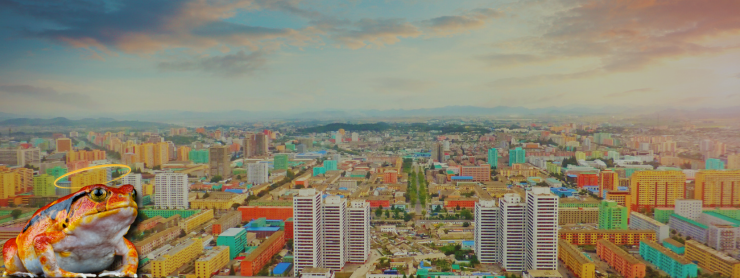
All Frogs Go To Heaven
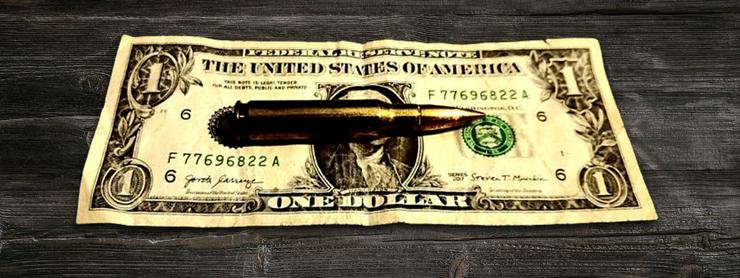
Where Does A Bullet Go?


